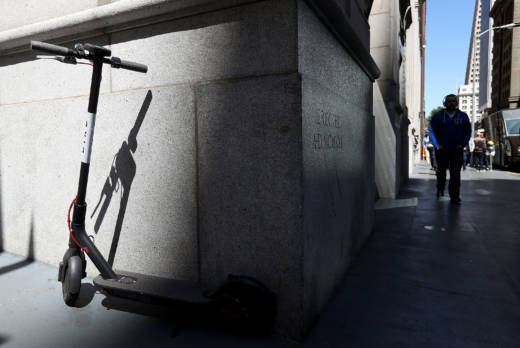He added that the company considers the current SFMTA proposal -- which could be submitted for approval by the agency's board next week -- to be "a draft for discussion."
Bird said Wednesday that as of last week it already was operating 1,614 scooters in the city. The company says that in its first 30 days of operation, it recorded 95,418 trips by 32,211 individual riders covering 143,725 miles -- an average of about a mile and a half per ride.
For a little context, Bird's ridership in its first 30 days averaged about 3,200 trips a day -- and close to 5,000 a day by last week. San Francisco transportation officials estimated the number of daily trips in the city by all modes last year at 4.1 million. That estimate includes 1.6 million trips a day by private cars, including 155,000 by Uber and Lyft.
Bird and its current scooter competitors in the city -- Spin and LimeBike -- all say their vehicles could be an important part of reducing traffic congestion and helping San Francisco realize its long-term goals of dramatically reducing car trips and greenhouse gas emissions.
Bird says it wants the city to adopt what it calls "dynamic caps" for scooter fleets -- essentially by letting companies determine the number of vehicles they deploy by user demand.
"We would look at how much the users are using each vehicle," Estrada said. "The way we think is the right way to do it is to cap the supply such that you don't add more supply unless your fleet of scooters is being utilized on average three rides per day per scooter."
A LimeBike spokesman said the firm will issue a response to the SFMTA proposal on Friday. Spin said it's reviewing the proposal and "deferring to SFMTA."
The regulation and permit process is the city's response to complaints that arose after the three companies launched the mini-vehicles without notice last month. Complaints have centered on users riding illegally on sidewalks and haphazardly parked scooters obstructing sidewalks. The city's Public Works agency says it has seized about 350 improperly parked scooters over the last 10 days.
City Attorney Dennis Herrera last week sent Spin, Bird and LimeBike cease-and-desist letters, and the firms face a deadline next Monday to file reports on what they're doing to end careless and/or illegal behavior by riders.
All three companies have vowed to act on the problems the city has raised. Bird's Estrada said concerns about sidewalk-riding and sloppy parking can be addressed through public safety and rider education campaigns -- while still allowing large numbers of scooters to be deployed.
"All of that is solvable," Estrada said. "The way we're not going to solve it is if we simply and reflexively cap the number of vehicles. All that's going to do is slow down something that's shown a lot of promise for taking cars off the road."
The SFMTA's Jamie Parks told a Board of Supervisors hearing last week that one of the agency's main goals in developing regulations was to understand how the scooters are being used -- whether, for instance, they're actually replacing trips taken by Uber and Lyft.
To accomplish that, the SFMTA's proposed permit rules for the 24-month pilot would require companies to share detailed data about how and when the scooters are used. The agency would also require the companies to have fare plans for low-income riders and adopt policies on user education privacy of user data. The firms would also need agree to operate in approved service areas and provide proof of insurance.
Parks said in an email Wednesday that the proposed cap of 500 scooters per permit -- a total of 2,500 citywide --could be raised if the 24-month pilot proves successful. The SFMTA estimates that a total of 2,000 to 2,500 scooters from the three firms are currently on the street.
